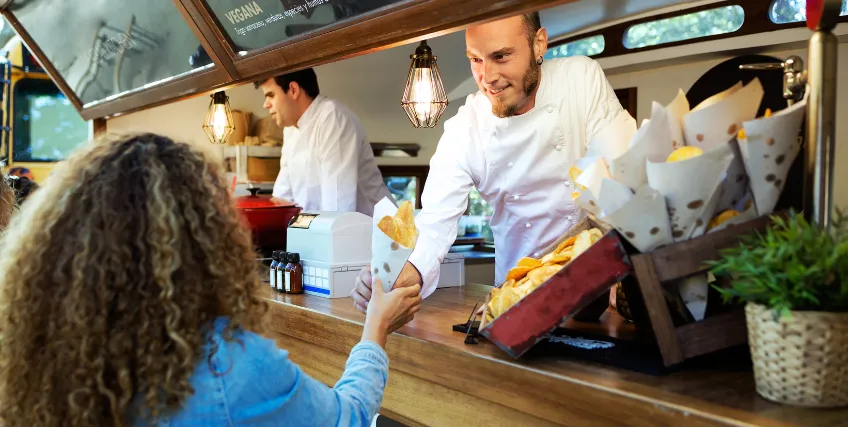How to Start a Food Truck Business Step-by-Step Guide for Beginners
August 08, 2025 | Last Updated on: August 08, 2025

Embarking on the journey of starting a food truck business is both an exciting and challenging endeavor. For many aspiring entrepreneurs, the allure of culinary creativity, working on your own terms, and engaging directly with your local community makes owning a food truck business one of the most rewarding ventures.
However, the road to success in this vibrant industry requires more than just a passion for food; it demands careful planning, diligent preparation, and a thorough understanding of the intricacies of mobile food service operations.
Understanding the Appeal of Food Trucks
Before diving into the steps to starting a food truck business, it is worth appreciating why the food truck industry has experienced such record growth and point of sale in the past few years.
With lower startup costs than traditional restaurants, food trucks offer greater versatility, the ability to reach diverse customer bases, and the ability to try out new tastes and trends without the risk of a dedicated brick-and-mortar location.
This vibrant environment is why starting a food truck business remains a valid and attractive business for so many food business owners.
Research and Concept Development
The first phase of starting a food truck business is all about defining your concept and doing extensive market research. Determining your target customer base, looking at trends in the local food truck scene, and examining your competition will provide you with critical knowledge on what kind of cuisine will appeal to people. Your concept should not only be a representation of your cooking prowess, but also something that fills a vacuum in the market where demand is still unsatisfied, like a restaurant business.
Once your concept is established, it is wise to study your target audience, typical event sites, and potential catering facilities. Understanding where and when your customers gather will drive your menu, pricing, and business strategies to serve food. Thoroughly executed, these phases of starting a food truck business set the stage for long-term profitability.
Crafting a Detailed Business Plan
Estimating your potential costs, sources of income, and timelines is crucial at this stage. Your business plan must include all the elements of your operation, including an executive summary, company overview, market analysis, plan of operations, marketing strategy, food items, food facility, and complete financial projections.
Lenders and investors will review this plan closely, but it's also your personal blueprint for the most important steps to starting a food truck business and generating revenue.
The business plan is not a form you complete; it makes you flesh out your concept, anticipate obstacles, and realistically estimate your capital needs. Figuring out these nitty-gritty details, like pricing strategy, locating suppliers, and identifying key performance indicators, will keep you grounded and focused while your business develops.
Navigating Legal Requirements and Permits
The most important first step in starting a food truck business may be to secure the proper food truck permits, food truck licenses, and health permit from health department certifications.
Legal considerations can vary greatly by city, county, and state. You typically will be required to obtain a business license, an employer identification number (EIN), a food service license, and a mobile vendor permit. Compliance with local health codes regulates even such ordinary things as kitchen layout and sanitation procedures.
Food department inspections will ensure your food truck adheres to all safety and cleanliness regulations of food prep. Have all details ready for your equipment, food storage, prep protocols, and even your commissary or food preparation area if required by law.
Without these permits, the most creative and delicious food truck won't be able to roll out onto the streets legally. Staying in front of regulations is central to starting a food truck business, and failing to comply can result in expensive setbacks.
Designing and Outfitting Your Food Truck
The next step in starting a food truck business is to purchase and customize your vehicle to meet your business needs. Some businessmen purchase a brand-new truck fully equipped, while others restore an older model.
Deciding which one is best for your food truck concept and operations is a heavy one. Critical considerations are the size of the kitchen, storage areas, ventilation, refrigeration, food establishment, and cooking equipment. The layout should maximize efficiency, ensure staff safety, and comply with health department regulations.
Spending money on a one-of-a-kind, eye-catching design can also establish your brand and attract customers' attention. How your food truck looks, combined with good signage and legible menu boards, can be the secret to generating buzz and standing out in a crowd in a foodie neighborhood or at festivals.
Mastering Menu Development and Sourcing Ingredients
Having a menu that is both innovative, convenient, and profitable is the key to success in starting a food truck business. As the kitchen space is limited and efficiency requires a fast preparation process, your offerings must be well-chosen to prepare quickly while preserving quality.
Specializing in a few signature items that speak of your culinary expertise and are capable of inducing repeat business is the advice to follow. Sourcing fresh, high-quality ingredients is also important. Building relationships with local producers, farmers' markets, or specialty food purveyors can create the flexibility and price stability necessary to keep your business competitive.
Menu prices must be based on ingredient cost, labor, and overhead while being attractive to your customer base. Constant assessment of menu items’ performance and alteration based on customer comments and margins is a key step to opening a food truck business and staying profitable.
Securing Funding and Managing Finances
The start-up cost of starting a food truck business varies widely by location, size of truck, and fit-out requirements. The typical expenses include the purchase or lease of the truck, equipment, initial inventory, license and permit expenses, liability insurance, and marketing.
A majority of owners fund their operations with a combination of personal savings, small business loans, or investments by family and friends.
Applying good accounting practices from the start makes it easier to track income, manage cash flow, and follow tax requirements. Hiring a professional accountant or investing in accounting software can simplify these tasks. Understanding your break-even point and monitoring daily expenses are the most important factors for starting a food truck business with staying power.
Finding the Right Locations and Events
With the operational foundation established, your attention turns to picking high-volume sites that coincide with your target market. Success for food trucks is frequently dependent on mobility and adaptability as you track the movement of potential consumers at active intersections, business areas, entertainment districts, or special events like festivals, fairs, and farmers markets.
There are also food truck parks in some cities, or rotating vendors at set locations. Securing regular spots, collaborating with local breweries, and participating in neighborhood events can all boost visibility. Getting acquainted with local laws regarding where new food trucks can park and serve will keep operations legal and hassle-free.
Crafting Your Marketing and Branding Strategy
Building a loyal customer base is the most important factor for long-term expansion when starting a food truck business. Proper branding, a catchy business name, a unique logo, and a cohesive visual identity convey reliability and credibility.
These days, a good marketing strategy requires a solid social media presence, utilizing platforms like Instagram, Facebook, and X to post menus, schedules, and daily updates. Engaging with customers via social networks and encouraging them to share reviews or photos of their experiences can increase your visibility.
Running special promotions, reward programs, and influencer or neighborhood business collaborations provides you with the authority to control the loyalty and repeat visits of your viewers. With such intense competition between mobile food businesses, improved promotion is typically the element that distinguishes successful food trucks from unsuccessful ones.
Hiring and Training Staff
As your food truck business grows after some time of starting a food truck business, you’ll need to recruit a dependable team. Hiring experienced cooks, friendly cashiers, and reliable support staff is a crucial step. Given the fast-paced, close-quarters environment of a food truck, cross-training employees for multiple roles enhances flexibility and efficiency.
Training should not only involve food preparation and handling but also health and safety protocols, customer handling, and cash management. Having clear expectations, processes, and a positive work environment ensures employee retention and overall success of your business.
Managing Daily Operations and Customer Service
The day-to-day operation of a food truck is a mix of culinary expertise, logistical coordination, and customer service prowess. Effective restocking, daily maintenance of the vehicle, and rigid compliance with food safety regulations must take precedence.
Being flexible and able to adapt is important, as inherent in the food truck business are unforeseen setbacks from bad weather to mechanical breakdowns.
Serving fast, friendly service and quality food every time creates a reputation for food truck operators. Customer feedback, whether solicited through surveys, social media, or simply conversation, is invaluable for continuous improvement when starting a food truck business.
Adjusting to Industry Trends and Expanding Your Business
The food truck industry evolves rapidly, shaped by shifting consumer preferences and economic trends.
Remaining current with new cuisine, eating habits (e.g., vegan or gluten-free), and integrating technology (e.g., contactless payment or pre-ordering apps) will render your products new and responsive.
Most successful food truck owners use their initial venture as a launching pad to greater ventures. The revenue brought in by the truck can eventually be invested in additional trucks, catering operations, or the final leap into a ground-floor restaurant location. Expansion should only occur when your systems, staff, and finances are stable enough to support new ventures without sacrificing quality.
Final Thoughts
Through the winding road of food entrepreneurship, starting a food truck business remains one of the most realistic paths to turning your passion into a profitable venture. By successfully working through each of the steps involved in opening up a food truck, from concept development and financing to operating on a day-to-day basis and interacting with customers, you position yourself for a fulfilling and maybe profitable career.
Every successful food truck story is built upon vision, perseverance, and an unshakeable commitment to quality and service, traits you can nurture at every step along the way. Through careful planning, a solid grasp of your market, and the ability to adapt, starting a food truck business unlocks the doors of creativity, flexibility, and personal satisfaction.
Whether serving lunch to working professionals, late-night festival eats, or becoming the neighborhood go-to, the food truck life is as diverse and rewarding as the cuisine you serve. By meticulous completion of each step, your dream of starting a food truck business can be a profitable, mobile culinary adventure.
FAQs About Starting a Food Truck Business
How much money should a food truck make a day?
Daily revenue varies based on location, events, weather, and competition. On average, a food truck can earn between $200 and $2,000 per day, with typical daily income hovering around $1,000.
Is it smart to start a food truck?
Starting a food truck can be profitable with proper planning and cost control. Compared to brick-and-mortar restaurants, food trucks have lower overhead, no rent for permanent space, and require fewer employees.
Does a food truck need commercial insurance?
Most states require commercial vehicle insurance for food trucks. It covers accidents, theft, vandalism, and weather damage, protecting your business assets on the road.
What is a ghost kitchen?
A ghost kitchen is a food preparation business that prepares food solely for delivery, with no restaurant where diners eat. It operates commercial facilities to focus on preparing meals for online orders from platforms and apps.
How to write a business plan for a food truck?
This startup food truck business markets fresh, locally made meals with a seasonal menu. It is targeting the urban market space and event firms with a strategy of marketing-driven growth. Operated by experienced owners, the company is looking for funding for start-up costs. Forecasts are good for revenue and profit in the first year of operations.
Frequent searches leading to this page
Term Loans are made by Itria Ventures LLC or Cross River Bank, Member FDIC. This is not a deposit product. California residents: Itria Ventures LLC is licensed by the Department of Financial Protection and Innovation. Loans are made or arranged pursuant to California Financing Law License # 60DBO-35839




